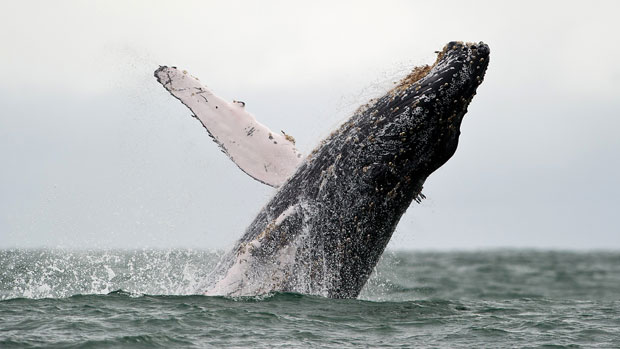What will Japan learn by resuming 'research' whaling?
Japan announces it will resume 'scientific whaling' in 2015, despite ban by the ICJ

A free daily email with the biggest news stories of the day – and the best features from TheWeek.com
You are now subscribed
Your newsletter sign-up was successful
Japan will restart its scientific whaling programme in 2015, according to the country's prime minister, Shinzo Abe.
Japan cancelled its scheduled 2014-2015 Antarctic hunt in the wake of an International Court of Justice ruling ordering its operation to stop, but Abe said that next year whaling for "research" purposes would resume.
In a meeting with Australia's prime minister, Tony Abbott, Abe explained that, in his view, the ICJ ruling simply sought to establish protocols for the sustainable use of resources.
The Week
Escape your echo chamber. Get the facts behind the news, plus analysis from multiple perspectives.

Sign up for The Week's Free Newsletters
From our morning news briefing to a weekly Good News Newsletter, get the best of The Week delivered directly to your inbox.
From our morning news briefing to a weekly Good News Newsletter, get the best of The Week delivered directly to your inbox.
"Based on this, Japan, looking at international law and scientific grounds, will engage in research whaling in order to collect the indispensable scientific information in order to manage the whale resources," he said.
Abe stressed that his country was a "good international citizen" and would adhere to the terms of the ICJ's decision.
Abbott expressed Australia's opposition to the programme, saying "Australia and Japan respectfully differ on the question of whaling".
The announcement sparked outcry from environmentalists, who believe that Japan's whaling programme is merely an attempt to circumvent the ban on the commercial whale meat trade.
A free daily email with the biggest news stories of the day – and the best features from TheWeek.com
There has been an international moratorium on commercial whaling in place since 1986, The Guardian notes, but Japan has continued its activities under an exemption that allows countries to hunt and kill whales for scientific purposes.
A "whale week" was recently held by Yoshimasa Hayashi, Japan's fisheries minister, to remind Japanese people about the place eating the animal has in their diet and culture.
Since 1995, Japanese whalers have killed about 3,600 minke, fin and other whales, the Financial Times reports, as part of a programme that claims to study whales' migratory patterns and the impact they have on the ocean ecosystems.
Darren Kindleysides, director of the Australian Marine Conservation Society, told Guardian Australia that there were ways to pursue whale research without killing the animals. "The ICJ judgment was damning over the lack of science and the fact Japan hasn't looked at non-lethal ways of collecting research on whales," he said. "With the methods we now have to study whales, it's a fallacy to say you have to kill them to study them".
-
 How the FCC’s ‘equal time’ rule works
How the FCC’s ‘equal time’ rule worksIn the Spotlight The law is at the heart of the Colbert-CBS conflict
-
 What is the endgame in the DHS shutdown?
What is the endgame in the DHS shutdown?Today’s Big Question Democrats want to rein in ICE’s immigration crackdown
-
 ‘Poor time management isn’t just an inconvenience’
‘Poor time management isn’t just an inconvenience’Instant Opinion Opinion, comment and editorials of the day
-
 Epstein files topple law CEO, roil UK government
Epstein files topple law CEO, roil UK governmentSpeed Read Peter Mandelson, Britain’s former ambassador to the US, is caught up in the scandal
-
 Iran and US prepare to meet after skirmishes
Iran and US prepare to meet after skirmishesSpeed Read The incident comes amid heightened tensions in the Middle East
-
 Israel retrieves final hostage’s body from Gaza
Israel retrieves final hostage’s body from GazaSpeed Read The 24-year-old police officer was killed during the initial Hamas attack
-
 China’s Xi targets top general in growing purge
China’s Xi targets top general in growing purgeSpeed Read Zhang Youxia is being investigated over ‘grave violations’ of the law
-
 Panama and Canada are negotiating over a crucial copper mine
Panama and Canada are negotiating over a crucial copper mineIn the Spotlight Panama is set to make a final decision on the mine this summer
-
 Why Greenland’s natural resources are nearly impossible to mine
Why Greenland’s natural resources are nearly impossible to mineThe Explainer The country’s natural landscape makes the task extremely difficult
-
 Iran cuts internet as protests escalate
Iran cuts internet as protests escalateSpeed Reada Government buildings across the country have been set on fire
-
 US nabs ‘shadow’ tanker claimed by Russia
US nabs ‘shadow’ tanker claimed by RussiaSpeed Read The ship was one of two vessels seized by the US military